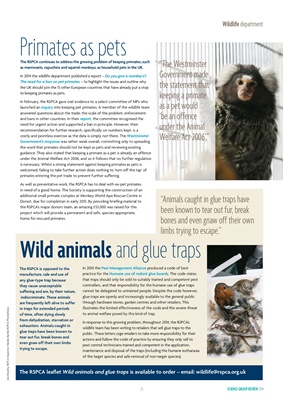
25 SCIENCE GROUP REVIEW 2014
Primates as pets
The RSPCA continues to address the growing problem of keeping primates, such
as marmosets, capuchins and squirrel monkeys, as household pets in the UK.
In 2014 the wildlife department published a report - Do you give a monkey's?:
The need for a ban on pet primates - to highlight the issues and outline why
the UK should join the 15 other European countries that have already put a stop
to keeping primates as pets.
In February, the RSPCA gave oral evidence to a select committee of MPs who
launched an inquiry into keeping pet primates. A member of the wildlife team
answered questions about the trade, the scale of the problem, enforcement
and bans in other countries. In their report, the committee recognised the
need for urgent action and supported a ban in principle. However, their
recommendation for further research, specifically on numbers kept, is a
costly and pointless exercise as the data is simply not there. The Westminster
Government's response was rather weak overall, committing only to spreading
the word that primates should not be kept as pets and reviewing existing
guidance. They also stated that keeping a primate as a pet is already an offence
under the Animal Welfare Act 2006, and so it follows that no further regulation
is necessary. Whilst a strong statement against keeping primates as pets is
welcomed, failing to take further action does nothing to 'turn off the tap' of
primates entering the pet trade to prevent further suffering.
As well as preventative work, the RSPCA has to deal with ex-pet primates
in need of a good home. The Society is supporting the construction of an
additional small primate complex at Monkey World Ape Rescue Centre in
Dorset, due for completion in early 2015. By providing briefing material to
the RSPCA's major donors team, an amazing £53,000 was raised for this
project which will provide a permanent and safe, species-appropriate,
home for rescued primates.
Wildlife department
"The Westminster
Government made
the statement that
keeping a primate
as a pet would
'be an offence
under the Animal
Welfare Act 2006'."
Wild animals and glue traps
The RSPCA is opposed to the
manufacture, sale and use of
any glue-type trap because
they cause unacceptable
suffering and are, by their nature,
indiscriminate. These animals
are frequently left alive to suffer
in traps for extended periods
of time, often dying slowly
from dehydration, starvation or
exhaustion. Animals caught in
glue traps have been known to
tear out fur, break bones and
even gnaw off their own limbs
trying to escape.
"Animals caught in glue traps have
been known to tear out fur, break
bones and even gnaw off their own
limbs trying to escape."
In 2010 the Pest Management Alliance produced a code of best
practice for the Humane use of rodent glue boards. The code states
that traps should only be sold to suitably trained and competent pest
controllers, and that responsibility for the humane use of glue traps
cannot be delegated to untrained people. Despite the code however,
glue traps are openly and increasingly available to the general public
through hardware stores, garden centres and other retailers. This
illustrates the limited effectiveness of the code and the severe threat
to animal welfare posed by this kind of trap.
In response to this growing problem, throughout 2014, the RSPCA's
wildlife team has been writing to retailers that sell glue traps to the
public. These letters urge retailers to take more responsibility for their
actions and follow the code of practice by ensuring they only sell to
pest control technicians trained and competent in the application,
maintenance and disposal of the traps (including the humane euthanasia
of the target species and safe removal of non-target species).
The RSPCA leaflet Wild animals and glue traps is available to order - email: wildlife@rspca.org.ukp://rspca.org.uk" target="_blank" title="Visit rspca.org.uk">rspca.org.uk
Joe Murphy, RSPCA Inspector Natalie Bartle/RSPCA Photolibrary